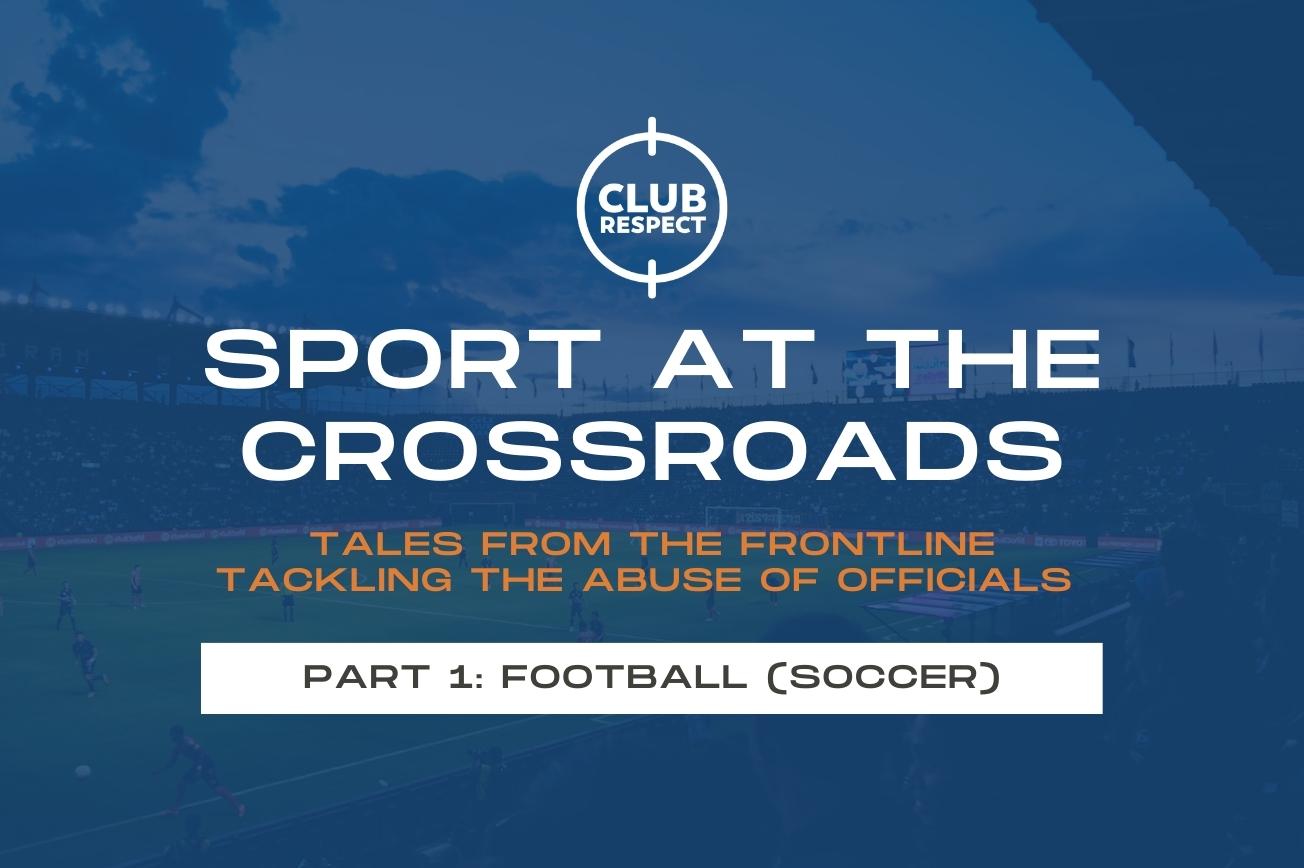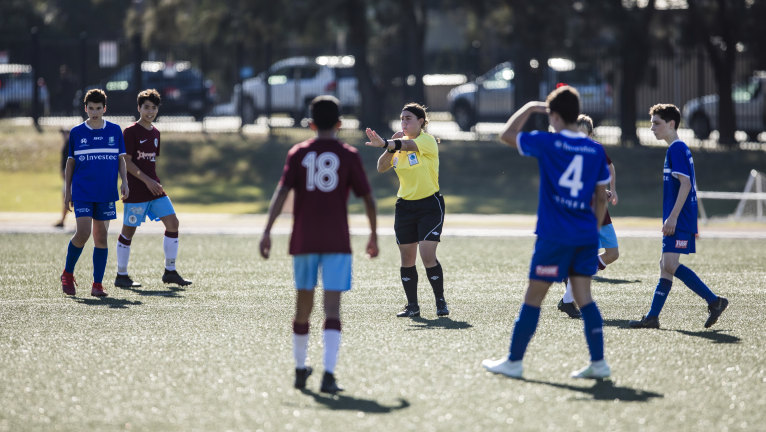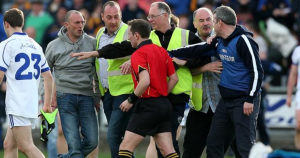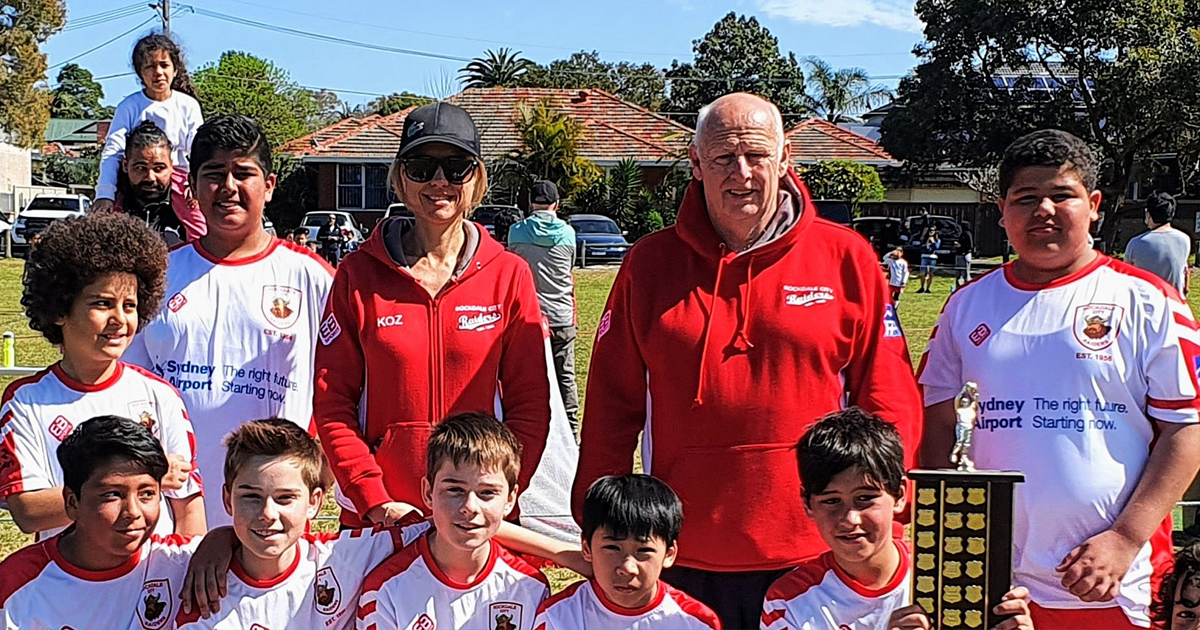Sport at the crossroads: Football's mountain to climb

This is Part 1 of our ‘Sport at the crossroads’ series, exploring the way different sports codes and associations are tackling the abuse of officials.
Part 1: Football (Soccer)
Part 2: Rugby League
Part 3: Aussie Rules (AFL)
Part 4: Netball
Part 5: Rugby Union
Part 6: Basketball
Part 7: Cricket
Tales from the frontline tackling the abuse of officials – Football (Soccer)
“Respect begins with this attitude: I acknowledge that you are a creature of extreme worth.”
– Author Gary Chapman
Every community club has them. The living and breathing saints who selflessly remain involved in the management of sporting clubs long after their own children have passed through.
People who inspire others to pay it forward and commit to something larger than themselves, defying the societal trend towards selfish individualism. People who remind you that strangers once invested their time in your development and trigger the obligation to continue the tradition.
In my world it’s Ron Ogilvie, aka Raider Ron, the President of the Rockdale City Raiders Football Club who has been investing his time and energy into the local community since 1978. He has put his heart and soul into ‘The Family Club” that his administration ancestors physically built from market gardens in 1956.
He’s seen and done it all including last year integrating more than 100 players from the local Egyptian Coptic community into the club, bringing them into mainstream participation with a smile.
However, even the perennially optimistic Raider Ron is disillusioned by the wave of disrespect for officials that is currently sweeping the sport. His emails to club coaches this year have devolved from early season optimism into despondence – a mix of reminders i.e. for parent crowd marshals to ‘WEAR THE YELLOW VEST’ & ‘NO TALKING TO THE REFEREE’ to sprinklings of bad news:
“Please help. As you all know there is a critical shortage of refs and in recent weeks, abuse of refs, particularly younger refs has gotten out of control. A number of referees have quit and the reason is ABUSE. And sadly Raider teams have not been blameless.
“A reminder of the Raiders Code of Conduct Line#1: Raiders will accept without questions all decisions of the referee, whether Official or Un Official.”
Some reminders are simple and consistent every week including:
- Please thank the Ref
- Three Cheers for the Ref after the game
And to close out an email most recently, an edict from the St George Football Association: “if any Player / Coach / Parent is reported for abuse or even criticism of a Referee, that team faces being ‘kicked out’ for the rest of the season and the club itself heavily fined.”
Occasionally Ron will deploy an attempt at empathy in his comms:
“If an adult – even approaches & questions a young Ref it is intimidating just standing there! (What if it were your Son or Daughter?)
TRUTH – Every player makes mistakes, Every Coach & Manager makes mistakes and SO DO REF’S!
In recent weeks some coaches have been given 2, 4 and 10 year suspensions!”
**
How did it get to this?
For Raider Ron, it’s a reflection of the increasing competitiveness of society: “Unless you get high marks in school you’ve failed and on our football parks, its not enough to have fun and play with your mates, the kids have to be the best, that’s what’s pushing it along.”
Ron notes that some teams are refusing to regrade themselves from beginners to intermediate level, instead preferring to deliver 10-0 victories over hapless opponents to: “fuel the egos of winning-addicted parents”.
The other phenomena driving bad sideline behaviour is what Ron calls: “Parents without Trophies syndrome” in which parents, under the mask of trying to better their kids, project their own issues trying to relive their own lives through their children.
Even when keeping scores have been removed and a non-competitive environment is provided as it is in Football Australia’s junior ‘MiniRoos’ program, some parents refuse to accept that questioning the referee is wrong.
“The St George Football Association’s weekly judiciary panels can’t police parent behaviour” according to Raider Ron and to protect the rest of the parents and meet their obligation of providing a safe workplace for the referees, he’s ready to go nuclear on repeat offenders:
“While it’s difficult to stop repeat offenders from attending public parks, we can throw out the teams that continue to cause trouble. Deregister all the players and they can sort it out with the offending parent(s) and come back the next year with some sort of improved accountability.”
Ron supports other stringent measures that are working: “If two teams have negative history, play the games behind locked doors with no family or fans. Take the privilege away and see how you go. Abandon games if you have to.”
“We’ve got to be stringent because we are facing an absolute disaster. One kid knocked out his coach for taking him off the field. Some parents on the same team got banned for 10 and 15 years for fighting each other. Coaches are squaring off. One association has gone from 3 abandoned games to 12 and send-offs have gone from 89 to189. It’s out of control and hurting a group of people just trying to have a game of competitive football.”
One thing that Raider Ron has seen work is for the Club Presidents to get involved in matters. With serious penalties involved, the truth and an agreed set of facts can be elusive.
“We’ve had our own issues and we’ve had to work them through and I think no club is immune. At times Club Presidents can get to the bottom of the matter in a more timely fashion than an independent panel.”
“Then we can move forward. And some mobile phone footage can help straighten things out. Whilst it goes up on Facebook and damages the game, at least we get some idea of what actually went on.”
A salute to all the Raider Rons out there.
**
One rung up the pathway, Craig Kiely, the CEO of the St George Football Association, is under no illusions that there is a quick solution to bad sideline behaviour: “There is no silver bullet and it’s ultimately up to the collective response to address what is a massive issue, because we’re short of referees and finding challenges bringing new ones in.”
“It is very frustrating. We want the participants from referees to players to coaches to parents to enjoy their experience. It shouldn’t be that hard.”
That referee disrespect and parent/coach/player misbehaviour has been so normalised is a concern to Kiely: “It’s a common topic, in every club meeting and every board meeting and it revolves around a simple question. Would you want to send your child into that environment?”
At club level, referees are churning out of the game but at Association level, Kiely has churned through lawyers, often volunteers drafted in to deal with the swollen disciplinary caseload: “We have lawyers chair our disciplinary panels on Tuesday and Thursday. We end up losing good people because of the idiocy of the conduct and you’re only as good as the info provided. The worst thing is the extra time and resources that are sucked into dealing with these negative things that could go into growing the game.”
There are some positives from his vantage point: “We’ve got some great Membership Protection Information Officers (MPIO), there’s a state government ‘Shoosh’ campaign and clever videos that can help build the all-important empathy piece. But at the end of the day its self-policing that will work for players, coaches and spectators. If the negative behaviour is not self-policed and people aren’t being accountable for their own group, it’s likely to blow.”
For Kiely, the way forward is tight co-operation between stakeholders: “We’ve put together working groups with key players including the police. Nobody looks good when the bad behaviour happens so lets take ownership together.”
None of us are stronger than all of us.
**
Part of the St George Football Association’s continued enlightenment on the importance of managing sideline behaviour is that the answers often lie outside in the world of best practice.
At the time of writing this piece, the St George Football Association had engaged an external group ‘Not On Our Watch’ to train all Club Presidents, Secretaries and MPIO officers in their ‘Managing Sideline Misconduct in Sport’ program.
The scenario-based training is aimed at upskilling clubs in complaint handling and setting up environments on the sideline that reduce misconduct and inappropriate behaviour from coaches, players, spectators and members of the public.
I had looked forward to attending this session run by CEO Morgan Lander, hoping to learn some new insights, but it was cancelled by the Covid19 lockdown.
Over the phone, Lander gave me a taste of the underlying philosophy of his session: “We have seen the many positives and at times, the negatives of community sport first hand. We recognise the vast majority of players, coaches, officials, administrators and spectators are an asset to their respective sports, however the risk of harm to any or all of these cohorts drives us to act.”
The mission is a tough one but the brief is clear for Lander: “We want sport to be safe and welcoming, free from fear or harm. That is why we offer various services, both preventative and responsive, to reduce risk.”
Morgan Lander Advisory offers 11 different products across different industries but according to Lander, the most in-demand training is the ‘Managing Sideline Misconduct session’.
Lander explains: “It tells me that anecdotally, sideline misconduct is front and centre for many sporting administrators.”
He works across the sports industry in incident management and crystallises the issues as often one of two things that lead to: “disgraceful behaviour directed at sporting officials.”
The first is the all familiar: “vicarious parent who sees their child as a sporting prodigy and will stop at nothing to ensure their child is first, best or wins.”
The second is: “the general lack of respect for officials within both junior and senior competitions combined with the lack of remorse for abusive behaviour from people who most often don’t have a refereeing qualification.”
Lander is a believer in a myriad of solutions driving change. Innovations he favours include: “exclusion zones for spectators policed by parent marshals and simple visual signage in high traffic areas.”
One day in a more respectful future it would be nice to think that Lander’s ‘Sideline Misconduct training’ services are no longer in such hot demand

**
“I’m not concerned with your liking or disliking me… All I ask is that you respect me as a human being.”
– Jackie Robinson
For the final source of wisdom on the referee abuse crisis in football, I headed south to Victoria for a state-level view from Nick Hatzoglou, the Head of Diversity and Inclusion from Football Victoria. Nick has deep cross-code experience including major stints at AFL Multicultural and the head of Club Cricket for Cricket Australia.
For Nick, the crisis of disrespect for officials is hitting the game hard. “Like a lot of sports we’ve got a huge challenge with officiating. It’s not a perfect science but when something goes wrong and people pile on the referee it has a long lasting effect on the person.”
The behaviour role modelling of referee interaction that younger players absorb from the professionals is a particularly troubling component for Hatzoglou.
He terms it the ‘Muscat effect’: “Kevin Muscat, in a similar fashion to Shane Warne’s umpire hustling in cricket, was always working the referee to try and get an advantage. It was always justified as gamesmanship but when replicated at grassroots level it has a negative impact, is not in the spirit of the game and makes it harder for the referee.”
When a player is ‘working the referee’ according to Hatzoglou, there are two key factors at play. In addition to inviting abuse of the referee from fans who believe they are backing their player, the referee is denied the authentic feedback loop to improve their performance.
“It breeds bad behaviour – if the referee makes a great decision, they can still be ridiculed and verbally abused by the other side. Even when they’re right they are wrong, which is unsettling at first and over time it starts to drain self-esteem and confidence. People don’t come back as referees because there is no job satisfaction. They often can’t wait to get out of the ground and go home when they’ve been abused even if they’ve refereed a perfect game.”
For Hatzoglou, the solution to this problem is a simple one: “Refs need support on game day – because often neither team is giving them authentic feedback, just trying to hustle for a free kick. In addition to official FFV reviewers on game day, they need additional support to provide honest and authentic feedback and nullify the negative talk. To say to them ‘don’t listen to what they’re saying, that was a great decision!’”
For the final word, Hatzoglou aims squarely at the players as big contributors to the problem, the influential pied pipers of their community who provide fans and parents with cues for negative or positive behaviour:
“With lower Covid19 attendances at games, crowds can hear a lot more including some questionable language by the players towards officials – and 90% of the time they are wrong and deflecting from their own mistakes. If a player gets away with swearing at an official it sends a signal to others that it’s permissible. If you overlay that behaviour over the top of a passionate local derby, you have the ingredients for trouble.”
**
Football, like a lot of sports, is experiencing high churn rates for its referees and struggling for a solution.
The old saying remains relevant. If you can’t talk about it, you can’t fix it. And the questions that need to be addressed remain:
Why should our glorious playing fields be the last publicly permissible bastion for verbal abuse, both on-field and off-field?
And why should becoming a referee, normally a powerful rite of passage for personal leadership development become an exercise in resilience in absorbing verbal abuse?
Join the Club Respect mailing list
Read Next:
Part 1: Football (Soccer)
Part 2: Rugby League
Part 3: Aussie Rules (AFL)
Part 4: Netball
Part 5: Rugby Union
Part 6: Basketball
Part 7: Cricket
Also by Patrick Skene:
Feature article: Sport’s ugly blind spot – abuse of officials


Patrick is a founder of Cultural Pulse, a leading micro-community marketing and engagement agency that has worked for the past 15 years on sports participation and fan engagement programs for over 100 communities. His recent book ‘The Big O, The Life & Times of Olsen Filipaina‘ has gone into reprint and his stories on the intersection of sport, history and culture have been published by The Guardian Australia, the Age, the Sydney Morning Herald and Inside Sport. He is currently the proud coach of the Rockdale Raiders Under 8B1’s.
Contact Patrick on twitter or LinkedIn
